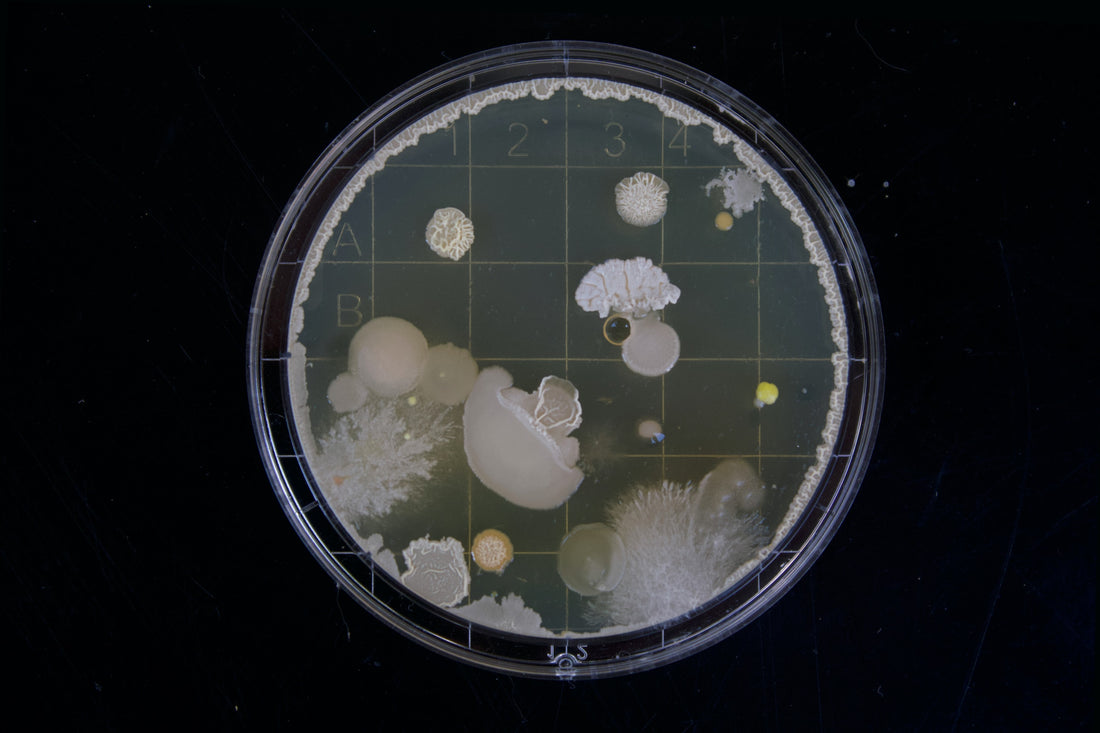Our skin is the largest organ in our body and its first line of defence against the external environment. While we often think of it as a collection of dead cells, it is, in fact, teeming with life – a diverse ecosystem of microorganisms collectively known as the skin microbiome. In recent years, the importance of another ecosystem, our gut microbiome, has been emphasized; its role in our digestion, nervous and immune systems. In fact, modern research has confirmed what we knew all along, that the gut-brain-skin axis is undeniable and is affecting not only intestinal and skin diseases, but also neurological-psychiatric-psychological disorders.
Now that the skin microbiome role is revealed as crucial in maintaining skin health and overall well-being we can explore how to nurture it.
But let’s start with the basics: what is the skin microbiome?
The skin microbiome consists of many millions of microorganisms that inhabit the various layers of our skin. These microorganisms include bacteria, fungi, viruses, and even tiny mites. Just like the gut microbiome, the skin microbiome is unique to each person, and its composition can vary greatly depending on factors like genetics, environment, and lifestyle.
The functions of the skin microbiome include:
- protection - it acts as a protective barrier against harmful pathogens by occupying space and consuming nutrients on the skin's surface
- immune system support - a balanced microbiome helps to regulate immune responses, reducing the risk of inflammation and skin disorders.
- pH regulation - microbes on the skin play a role in regulating the pH, ensuring that it remains in the slightly acidic range, maintaining its integrity and preventing infection.
- nutrient synthesis - some skin microbes can synthesize essential nutrients and vitamins, such as vitamin B and folic acid, which contribute to overall skin health.
Research has shown that an imbalanced or disrupted skin microbiome can lead to various skin conditions. Conditions such as acne, eczema, psoriasis, and rosacea have all been linked to alterations in the composition of the skin microbiome. Understanding these connections can lead to innovative treatments that target the microbiome to alleviate skin issues.
What are the factors that affect the balance?
As mentioned before, the skin microbiome is unique, like a fingerprint, and it can be affected by a range of internal and external factors such as age, gender, ethnicity, profession and most of all, the health of the host. Temperature, humidity and UV radiation all have an effect, too. Some of those are beyond our control, but many aren’t. Cosmetics and skincare routine aim to improve the quality of the skin. Their usage improves hydration, which then leads to an increased diversity of the microbiome. But they can also have a negative effect; some preservatives, surfactants or even essential oils can have an adverse effect on the skin microbiota and lead to infection and inflammation.
The big question is, what can you do to support a healthy skin microbiome? Here are some tips:
• gentle cleansing: avoid using harsh soaps and cleansers that strip the skin of its natural oils and disrupt the microbiome. Opt instead for gentle, pH-balanced cleansers that clean without causing imbalance
• probiotic skincare: some skincare products now contain prebiotics, probiotics and postbiotics, which can help maintain a healthy skin microbiome. These products can promote the growth of beneficial microorganisms and support healthy skin barrier
• diet: a diet rich in fiber, prebiotics, and fermented foods can positively influence the skin microbiome. Consuming probiotics in the form of yogurt, kefir, or supplements can also contribute to a more diverse microbiome
• avoid overuse of antibiotics: excessive use of antibiotics can disrupt the skin microbiome. When prescribed antibiotics, be sure to follow your healthcare provider's instructions carefully. This also applies to acne treatment. Consider the use of alternatives like benzoyl peroxide or tretinoin
• sun protection: sunscreen is not only essential for protecting your skin from UV damage, but can also help maintain a balanced skin microbiome by shielding it from environmental stressors
To summarise, the skin microbiome is a complex and dynamic ecosystem that plays a vital role in maintaining healthy skin. As our understanding of this microscopic world deepens, we are likely to see more skincare products and treatments designed to support a healthy skin microbiome. By adopting a holistic approach to skincare, we can achieve not only radiant and healthy skin, but also better overall well-being.
Literature used in this article:
- Ferraretto et al., Editorial: The gut-skin-brain axis in human health and disease, Front. Nutr., 16 February 2023, Sec. Nutrition, Psychology and Brain Health
- De Pessemier et al., Gut–Skin Axis: Current Knowledge of the Interrelationship between Microbial Dysbiosis and Skin Conditions, Microorganisms. 2021 Feb; 9(2): 353.
- Dapkevicius et al., Acne Vulgaris Topical Therapies: Application of Probiotics as a New Prevention Strategy, Cosmetics 2023, 10(3), 77
- Skowron et al., Human Skin Microbiome: Impact of Intrinsic and Extrinsic Factors on Skin Microbiota, Microorganisms. 2021 Mar; 9(3): 543.
- Moskovicz et al., Extrinsic Factors Shaping the Skin Microbiome, Microorganisms. 2020 Jul; 8(7): 1023.

